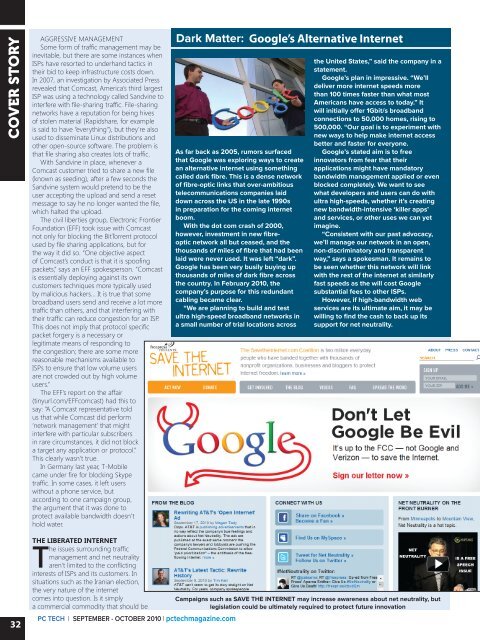Issue Seven - Conversations on Technology, Business and Society
Issue Seven - Conversations on Technology, Business and Society
Issue Seven - Conversations on Technology, Business and Society
You also want an ePaper? Increase the reach of your titles
YUMPU automatically turns print PDFs into web optimized ePapers that Google loves.
COVER STORY<br />
32<br />
AGGRESSIVE MANAGEMENT<br />
Some form of traffic management may be<br />
inevitable, but there are some instances when<br />
ISPs have resorted to underh<strong>and</strong> tactics in<br />
their bid to keep infrastructure costs down.<br />
In 2007, an investigati<strong>on</strong> by Associated Press<br />
revealed that Comcast, America’s third largest<br />
ISP was using a technology called S<strong>and</strong>vine to<br />
interfere with file-sharing traffic. File-sharing<br />
networks have a reputati<strong>on</strong> for being hives<br />
of stolen material (Rapidshare, for example<br />
is said to have “everything”), but they’re also<br />
used to disseminate Linux distributi<strong>on</strong>s <strong>and</strong><br />
other open-source software. The problem is<br />
that file sharing also creates lots of traffic.<br />
With S<strong>and</strong>vine in place, whenever a<br />
Comcast customer tried to share a new file<br />
(known as seeding), after a few sec<strong>on</strong>ds the<br />
S<strong>and</strong>vine system would pretend to be the<br />
user accepting the upload <strong>and</strong> send a reset<br />
message to say he no l<strong>on</strong>ger wanted the file,<br />
which halted the upload.<br />
The civil liberties group, Electr<strong>on</strong>ic Fr<strong>on</strong>tier<br />
Foundati<strong>on</strong> (EFF) took issue with Comcast<br />
not <strong>on</strong>ly for blocking the BitTorrent protocol<br />
used by file sharing applicati<strong>on</strong>s, but for<br />
the way it did so. “One objective aspect<br />
of Comcast’s c<strong>on</strong>duct is that it is spoofing<br />
packets,” says an EFF spokespers<strong>on</strong>. “Comcast<br />
is essentially deploying against its own<br />
customers techniques more typically used<br />
by malicious hackers… It is true that some<br />
broadb<strong>and</strong> users send <strong>and</strong> receive a lot more<br />
traffic than others, <strong>and</strong> that interfering with<br />
their traffic can reduce c<strong>on</strong>gesti<strong>on</strong> for an ISP.<br />
This does not imply that protocol specific<br />
packet forgery is a necessary or<br />
legitimate means of resp<strong>on</strong>ding to<br />
the c<strong>on</strong>gesti<strong>on</strong>; there are some more<br />
reas<strong>on</strong>able mechanisms available to<br />
ISPs to ensure that low volume users<br />
are not crowded out by high volume<br />
users.”<br />
The EFF’s report <strong>on</strong> the affair<br />
(tinyurl.com/EFFcomcast) had this to<br />
say: “A Comcast representative told<br />
us that while Comcast did perform<br />
‘network management’ that might<br />
interfere with particular subscribers<br />
in rare circumstances, it did not block<br />
a target any applicati<strong>on</strong> or protocol.”<br />
This clearly wasn’t true.<br />
In Germany last year, T-Mobile<br />
came under fire for blocking Skype<br />
traffic. In some cases, it left users<br />
without a ph<strong>on</strong>e service, but<br />
according to <strong>on</strong>e campaign group,<br />
the argument that it was d<strong>on</strong>e to<br />
protect available b<strong>and</strong>width doesn’t<br />
hold water.<br />
THE LIBERATED INTERNET<br />
The issues surrounding traffic<br />
management <strong>and</strong> net neutrality<br />
aren’t limited to the c<strong>on</strong>flicting<br />
interests of ISPs <strong>and</strong> its customers. In<br />
situati<strong>on</strong>s such as the Iranian electi<strong>on</strong>,<br />
the very nature of the internet<br />
comes into questi<strong>on</strong>. Is it simply<br />
a commercial commodity that should be<br />
Dark Matter:<br />
PC TECH | SEPTEMBER - OCTOBER 2010 | pctechmagazine.com<br />
As far back as 2005, rumors surfaced<br />
that Google was exploring ways to create<br />
an alternative internet using something<br />
called dark fibre. This is a dense network<br />
of fibre-optic links that over-ambitious<br />
telecommunicati<strong>on</strong>s companies laid<br />
down across the US in the late 1990s<br />
in preparati<strong>on</strong> for the coming internet<br />
boom.<br />
With the dot com crash of 2000,<br />
however, investment in new fibreoptic<br />
network all but ceased, <strong>and</strong> the<br />
thous<strong>and</strong>s of miles of fibre that had been<br />
laid were never used. It was left “dark”.<br />
Google has been very busily buying up<br />
thous<strong>and</strong>s of miles of dark fibre across<br />
the country. In February 2010, the<br />
company’s purpose for this redundant<br />
cabling became clear.<br />
“We are planning to build <strong>and</strong> test<br />
ultra high-speed broadb<strong>and</strong> networks in<br />
a small number of trial locati<strong>on</strong>s across<br />
Google’s Alternative Internet<br />
the United States,” said the company in a<br />
statement.<br />
Google’s plan in impressive. “We’ll<br />
deliver more internet speeds more<br />
than 100 times faster than what most<br />
Americans have access to today.” It<br />
will initially offer 1Gbit/s broadb<strong>and</strong><br />
c<strong>on</strong>necti<strong>on</strong>s to 50,000 homes, rising to<br />
500,000. “Our goal is to experiment with<br />
new ways to help make internet access<br />
better <strong>and</strong> faster for every<strong>on</strong>e.<br />
Google’s stated aim is to free<br />
innovators from fear that their<br />
applicati<strong>on</strong>s might have m<strong>and</strong>atory<br />
b<strong>and</strong>width management applied or even<br />
blocked completely. We want to see<br />
what developers <strong>and</strong> users can do with<br />
ultra high-speeds, whether it’s creating<br />
new b<strong>and</strong>width-intensive ‘killer apps’<br />
<strong>and</strong> services, or other uses we can yet<br />
imagine.<br />
“C<strong>on</strong>sistent with our past advocacy,<br />
we’ll manage our network in an open,<br />
n<strong>on</strong>-discriminatory <strong>and</strong> transparent<br />
way,” says a spokesman. It remains to<br />
be seen whether this network will link<br />
with the rest of the internet at similarly<br />
fast speeds as the will cost Google<br />
substantial fees to other ISPs.<br />
However, if high-b<strong>and</strong>width web<br />
services are its ultimate aim, it may be<br />
willing to find the cash to back up its<br />
support for net neutrality.<br />
Campaigns such as SAVE THE INTERNET may increase awareness about net neutrality, but<br />
legislati<strong>on</strong> could be ultimately required to protect future innovati<strong>on</strong>


